4 Key areas that you need to know about Payroll Tax
Payroll tax is a State and Territory based tax that applies to wages paid by an employer to employees. It is often viewed as a disincentive to employing additional staff and as with many taxes, the devil is in the detail.
Many SME businesses need to be aware of the thresholds for registration and also the key concepts that can trigger registration requirements, even if it looks like you’re below the threshold.
Some organisations are exempt (generally non-profit, public benevolent institutions and religious institutions), so the focus here is on non-exempt employers.

What is included as ‘wages’?
Wages subject to payroll tax is a broad concept and includes:
- Salaries and wages
- Allowances
- Bonuses and commissions
- Certain contractor payments (exceptions apply)
- Director fees
- Employee termination payments
- Superannuation contributions
- Reportable fringe benefits
There are other amounts that can be included, but these are the ones that make up the majority of payroll tax lodgements.
If ‘wages’ paid by you (or your group) exceed the threshold for your state or territory, you will have a payroll tax obligation.
2019-20 Payroll Tax Rates and Thresholds
- Rural/regional rate – conditions apply to using this rate
- The monthly threshold is affected by the number of days in the month
- The rate is calculated on a variable or tiered scale that increases on the wages paid in the financial year
- The minimum threshold will increase from $600,000 to $1,500,000 from 1 January 2019. Revenue SA has a calculator here.
Grouping
A common misunderstanding is a failure to group associated businesses. Where an employer owns, controls or is closely related to another business they may form a group and wages for both entities are combined for payroll tax. This can have significant impact as only one member of the group (referred to as the Designated Group Employer) will usually claim the tax-free threshold.
You may wonder — what if your businesses act at an arm’s length basis with each other, do they still form a group? The unfortunate answer is most likely, yes.
This can be a hard lesson in consequences. If you have not identified your group as being over the threshold and are hit with a payroll tax investigation, you may find yourself liable for several years of payroll tax, shortfall interest and penalties.
Which State to register in?
Where a payroll tax obligation exists the employer must register in that state or territory. This can be confusing where employees perform work in more than one jurisdiction.
The nexus provisions determine which state or territory payroll tax is paid. If an employee performs work wholly in one state or territory, payroll tax is payable in that jurisdiction. If an employee performs work in more than one state or territory over that month or year, payroll tax is paid in the jurisdiction in which that employee has a permanent place of residence. This is regardless of whether any work was performed in their resident state.
It is important that employees are included in their appropriate jurisdiction as each state and territory have their own thresholds.
If you have any concerns about Payroll Tax, our experts are here to help you through the process. We assist our clients with general advice, registration and monthly or annual compliance. Please do not hesitate to contact our Tax and Advisory Specialists for support. Alternatively, you can complete your contact details below or give us a call on (03) 9835 8200.
